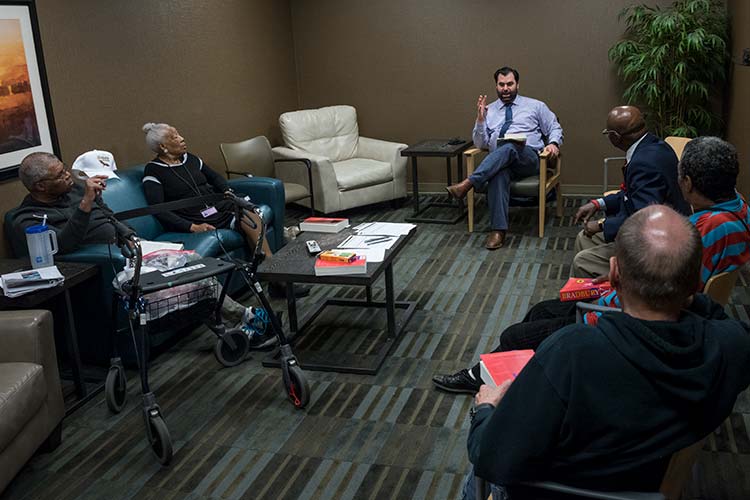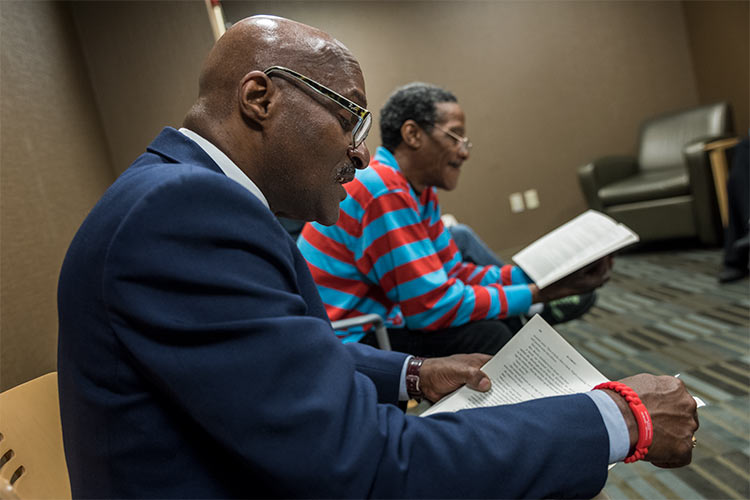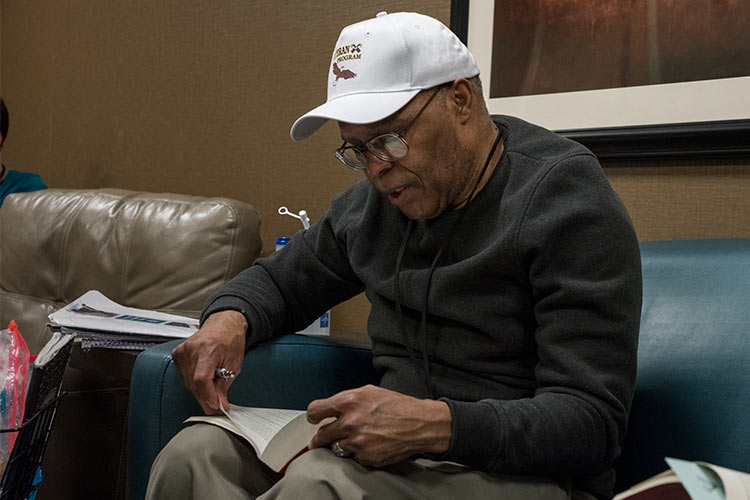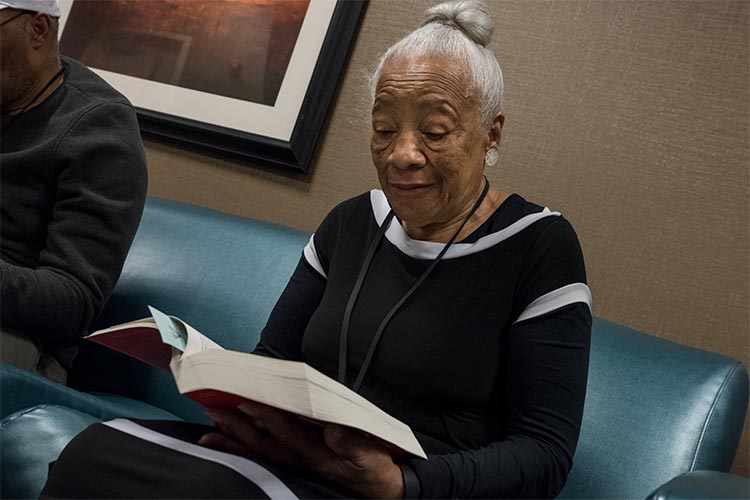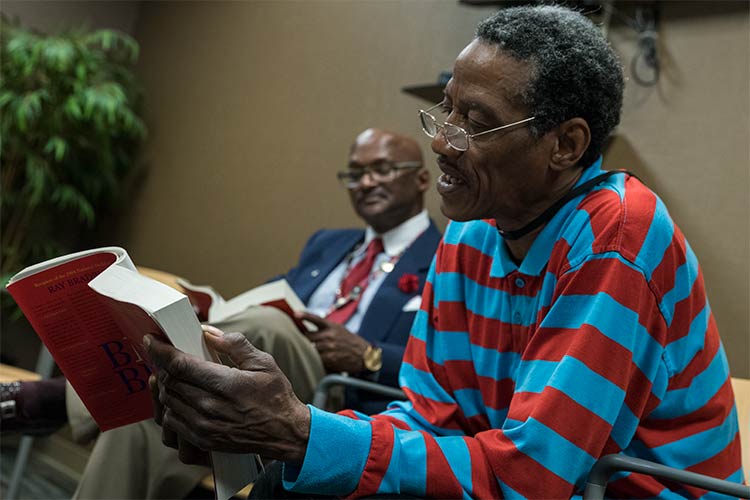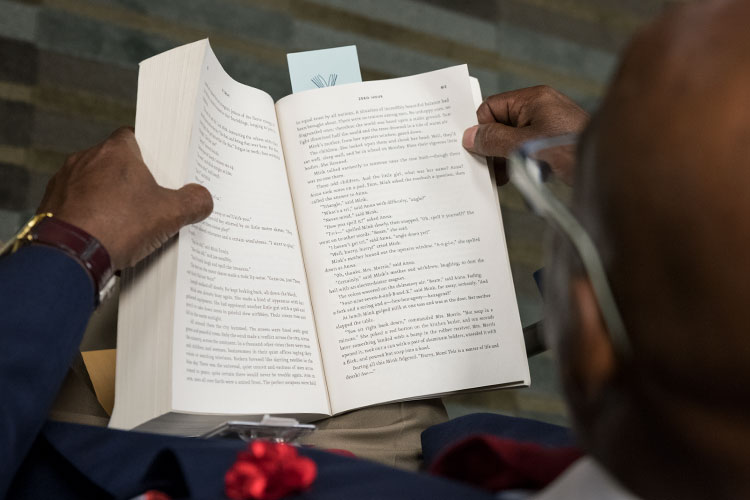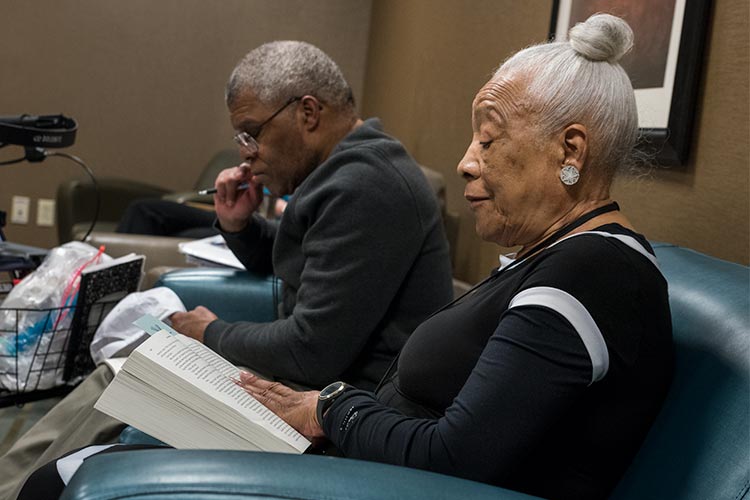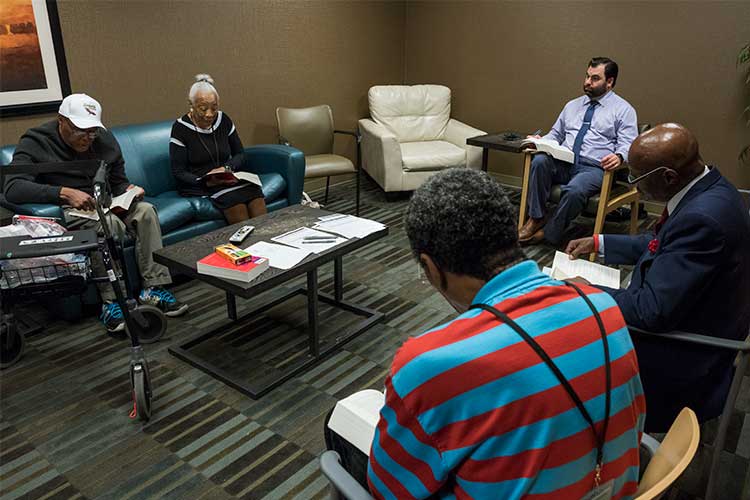Literature changing lives: Books@Work helps local veterans start a new chapter
At 10 a.m. on a Thursday morning, a group of veterans has gathered in the TV room on the first floor of the VA Domiciliary, located off East 105th Street in Glenville. These veterans—all men on this particular day—grew up in different cities in varying socio-economic settings. They served in different wars and suffer from different challenges: addiction, depression, homelessness, loneliness, PTSD. Most wear some signature military apparel, camouflage pants, a US Marine sweatshirt, or an Army baseball cap.
Today, they have one thing in common: “The Smiling People” by Ray Bradbury. Each has read the short story in advance from an anthology of the famous science-fiction author’s work. It’s part of an optional weekly session conducted by Books@Work, during which they will participate in a discussion gently facilitated by one of the organization’s participating college professors. (Today, it’s Thom Dawkins, a lecturer in the Case Western Reserve University English Department.)
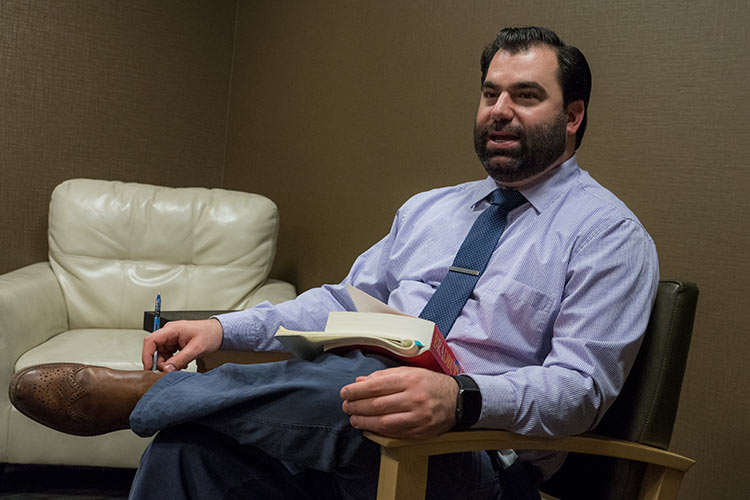 “The people at the VA are deeper wells,” observes Ann Kowal Smith, the founder and executive director of Books@Work, about the rich insights veterans typically bring to their story discussions. “It’s such a great example of how we place people into boxes, and lo and behold, those boxes aren’t the appropriate fit.”
“The people at the VA are deeper wells,” observes Ann Kowal Smith, the founder and executive director of Books@Work, about the rich insights veterans typically bring to their story discussions. “It’s such a great example of how we place people into boxes, and lo and behold, those boxes aren’t the appropriate fit.”
Located adjacent to the Louis Stokes Cleveland VA Medical Center, the residential treatment center provides clinical rehabilitation and treatment programs for male and female veterans who may stay for several months or longer. One of 130 throughout the country, the VA Domiciliary building is owned and operated by the Volunteers of America, but the VA runs the treatment programs.
Smith has offered the program at the VA Domiciliary for almost two years now, but she first launched the innovative organization in 2009, starting with food service employees at AVI Foodsystems and employing professors from Hiram College as facilitators. She found that the professors gained from learning the perspectives of non-traditional learners, while supervisors discovered that participants “asked better questions” and were more engaged with each other and their customers.
Using fiction and non-fiction books as the fulcrum, participants find common ground.
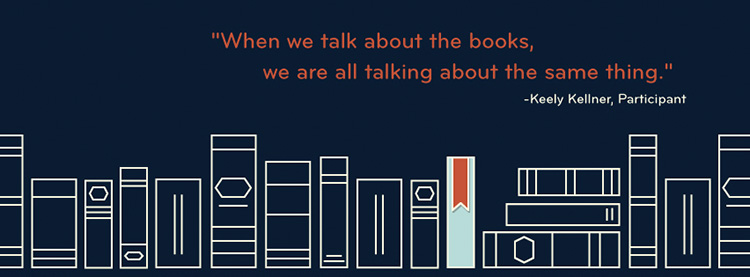
“We’ve identified that these discussions of literature create opportunities for all of the participants to connect and make deeper social connections, which give rise to an enhanced feeling of social wellness or sense of belonging,” Smith informs.
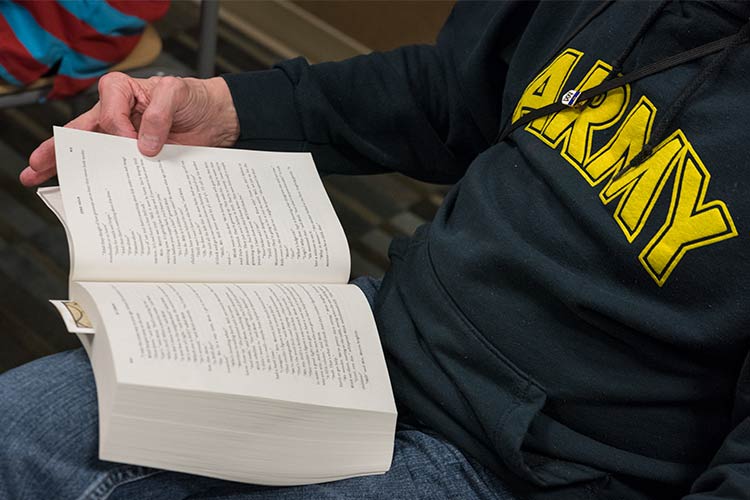 That appears to be the case at the Domiciliary, where the gathered veterans begin by reading the story aloud (after briefly introducing themselves and their branch of service and whether they served in combat or peacetime). Seated on a comfortable couch or plush chairs, each of the eight men—save for one who remains quiet throughout the session—covers a page or two of the long story before letting someone else take the next section.
That appears to be the case at the Domiciliary, where the gathered veterans begin by reading the story aloud (after briefly introducing themselves and their branch of service and whether they served in combat or peacetime). Seated on a comfortable couch or plush chairs, each of the eight men—save for one who remains quiet throughout the session—covers a page or two of the long story before letting someone else take the next section.
By 10:45 a.m., they finish reading this tale about a man who berates his family members during a special meal he has prepared for them, only with the classic Bradburian twist that he has recently murdered all of them.
A fairly in-depth discussion follows about who this man was and why he did what he did. The veterans may have different levels of formal education, but they all draw from abundant life experience, which results in some revealing insights and a detailed profile of the murderous main character.
“His family never did listen to him,” says one veteran wearing camo pants, a colorful T-shirt and Navy blue hoodie seated by the door in a rollator walker. “But now they have to—in his mind.”
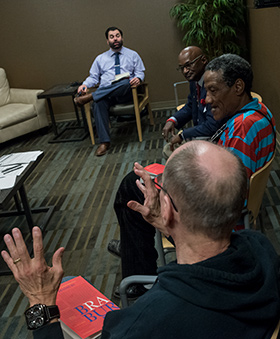 Books@Work session at the VA DomiciliaryIt’s conversations like these that keep a dedicated group of veterans returning each week for literature exploration and insights. “The residents have a lot of appointments during the day, but generally we have a base of about four people that come every week,” explains Walter Byers, MSW, LSC, a social worker for the US Department of Veterans Affairs.
Books@Work session at the VA DomiciliaryIt’s conversations like these that keep a dedicated group of veterans returning each week for literature exploration and insights. “The residents have a lot of appointments during the day, but generally we have a base of about four people that come every week,” explains Walter Byers, MSW, LSC, a social worker for the US Department of Veterans Affairs.
He adds that the veterans also have the option to attend a session on Tuesday nights, which can be a little easier because they don’t have other therapy or counseling sessions scheduled in the evenings.
Byers, too, is an Army veteran of the Vietnam War who spent some time at the facility before recovering his life and earning his masters in social work at Kent State University. He actively participates throughout the session, as does Dawkins. “It’s very therapeutic for me, too,” he adds.
The VA Domiciliary is just one of many business and manufacturing clients that Books@Work serves. Its mission is to enable employers to discover leadership potential and capabilities in their employees, acting as an employee retention program of sorts.
Selected authors have included Gabriel Garcia Marquez, O. Henry, Langston Hughes, and James McBride (who wrote The Color of Water: A Black Man’s Tribute to his White Mother). Some of the authors, like the latter two, are chosen from winners of the Anisfield-Wolf Book Awards, a distinguished component of Cleveland’s literary legacy.
Smith first developed the idea for the pilot project that eventually became Books@Work after participating in a learning initiative created by four foundations. Titled Education Works, the project was designed to consider ways that learning initiatives could be improved throughout Northeast Ohio. She realized that there were many programs to keep kids in school, prevent them from dropping out, and help them get into college—and while all of those are critical, there was a sizable gap in providing similar programs for adults.
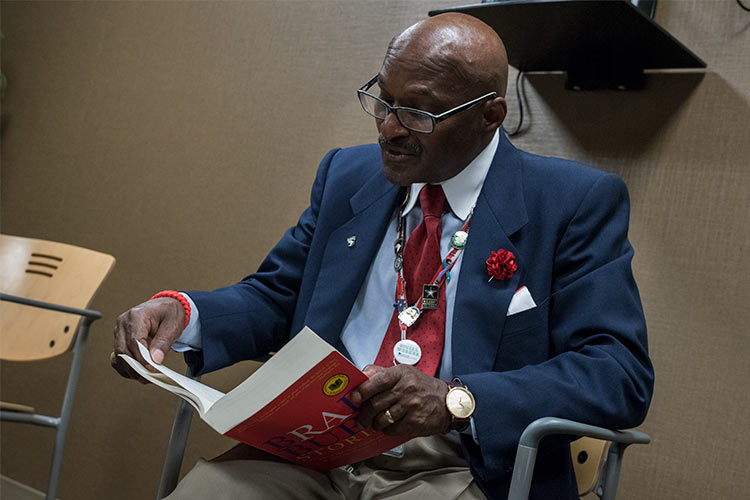 Walter Byers, MSW, LSC, a social worker for the US Department of Veterans Affairs reads at a recent Books@Work session at the VA Domiciliary“Once an adult has left the system, there’s almost nothing to get them back in, and unless you have people who have the time, money, and inclination to go back on a lifelong learning journey, there’s not much to continue education or participate in lifelong learning for the average adult.”
Walter Byers, MSW, LSC, a social worker for the US Department of Veterans Affairs reads at a recent Books@Work session at the VA Domiciliary“Once an adult has left the system, there’s almost nothing to get them back in, and unless you have people who have the time, money, and inclination to go back on a lifelong learning journey, there’s not much to continue education or participate in lifelong learning for the average adult.”
Smith emphasizes that Books@Work is not a traditional literacy program, but rather a sophisticated adult learning experience. In other words, the participants at the VA or her other business clients are not illiterate people.
To date, the organization has grown to more than 20 states and seven foreign countries, serving more than 6,000 people so far. Smith is overseeing continued, fairly rapid growth and hopes to augment it to where the program serves more than 100,000 people annually. She’s also got her eye on expanding the VA sessions nationally in the near future.
“We’re using our VA program to learn the best way to serve this domiciliary population,” she says. “Once we get good at working with a fairly transient population of the veterans in residential treatment, it’s something we would like to unfold much more broadly.”
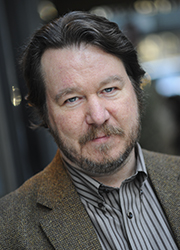
About the Author: Christopher Johnston
Christopher Johnston has published more than 3,000 articles in publications such as American Theatre, Christian Science Monitor, Credit.com, History Magazine, The Plain Dealer, Progressive Architecture, Scientific American and Time.com. He was a stringer for The New York Times for eight years. He served as a contributing editor for Inside Business for more than six years, and he was a contributing editor for Cleveland Enterprise for more than ten years. He teaches playwriting and creative nonfiction workshops at

